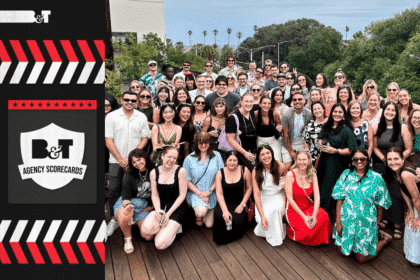Todd Sampson, former CEO of Leo Burnett-turned-documentary host, is aiming to tackle one of society’s largest, most complex issues in his latest project.
Mirror Mirror, a two part documentary by Channel 10, explores body image. It is, of course, an incredibly broad topic – a fact which Mirror Mirror acknowledges. In the course of two episodes, Sampson (pictured above in the show) explores everything from face lifts and ageism to muscle dysmorphia to hyper-sexualisation of our bodies online.
There are a number of threads at play throughout the episodes: the role of the advertising industry, the role of social media, the role of of innate, immutable human psychology. And, of course, the role of us as individuals too.
Sampson deftly explores the complexities of idealised beauty through the program’s structure. Each episode includes multiple ‘chapters’, all more or less devoted to an individual.
“I believe that body dissatisfaction is a global societal crisis that we all face: young, old, male, female, transgender, non binary,” Sampson explained in an interview with B&T,
“It is a big topic, and it’s a topic that needs light on it. And to get that light to work, you need to come from multiple perspectives and let them tell their story.”
The series is certainly more powerful because of the real stories told. From a young woman who undergoes liposuction to a look into the eating habits of a body building champion to a transgender woman seeking facial feminisation surgery: each narrative tells a powerful story of conforming to and eschewing conventional beauty standards, and the expectations those standards place on us.
Early in the first episode, Sampson points to the crucial role the advertising industry has played in determing what is beautiful. The viewer is privy to a photo shoot, where we see an already very conventionally handsome male model subject to retouching. That adland has not just contributed to, but created, increasingly unattainable ideals of beauty and exported them globally is undeniable.
However, Sampson is clear: “I don’t blame advertising for what we face. I don’t blame social media, for what we face as a society. In many ways you can blame capitalism. But all those other industries, in some ways are just tools of a greater machine, and that greater machine is slowly over time changing.”
Equally as significant as the industry’s role in creating an impossible beauty ideal is the potential for adland to dismantle that same standard.
“I love, and worked withing [the advertising industry] for a very long time. There are a lot of good people in that industry. A lot of people that care, a lot of people with good ethics, a lot of people that want to make a difference,” said Sampson.
“And we want to encourage those people to continue within the industry. Because those are the people that will make a difference. And I absolutely believe you can make a difference from within. In fact, you could argue that they’re the only real people that can.”
Corporations have taken advantage of cracks in self esteem for profit. But, Sampson thinks, “over time, these organisations are growing a conscience on some level.”
That being said, when asked on whether he thinks we can ever truly dismantle beauty ideals, Sampson reflected that he’s “not certain that there’s a switch that we flick, and then that’s it, we’re off.”
Part of a solution, according to scientific research discussed in the series, is increased diversity in media.
Increased diversity, Sampson explained, “has a dramatic impact on people’s body satisfaction”.
“The reason for that is our brain is plastic, we adapt to the world we see around us. So, if we are constantly surrounded by with edited photos, and perfect bodies filtered through whatever software that we can – if we’re surrounded by a uniform ideal – then we start to believe we’re inadequate. The more diversity you show, and the people who take responsibility for that work in the industry, the better that’s going to be.”
While diversity is something of a buzzword, the genuine importance of giving all bodies, and all stories, a platform is incredibly powerful. Our world is, fundamentally, a diverse one. The power of seeing someone who looks, speaks, acts, is like you on screen – particularly for those in minority groups – can have transformative effect.
One of Mirror Mirror‘s most important stories is that of Tara, a transgender woman. How often are the stories and experiences of the many thousands trans and non binary Australians told on mainstream television?
Tara with Todd Sampson on Mirror Mirror
“We didn’t choose Tara story for diversity reasons, we chose Tara’s story because it is, in some ways the pointy end of how strong this beauty ideal can be,” Sampson said.
“I am glad in retrospect, that we got the opportunity to put a trans voice on national, global television. I’m stoked about that.”
And, if there is a goal of Mirror Mirror, it is conversation.
“[That’s] what I’m hoping comes out of it,” Sampson expained. He wants to raise awareness and address the “echo chamber of discontent that we now live in”.
Sampson is a parent of two young girls, who feature in the film. One of his hopes is that Mirror Mirror will become a reference point for adults, to productively address body image with young people.
He is also prepared for backlash.
“I know some people will be infuriated by the film. I know some people will be offended, there’ll be people on both sides, because there’s a lot and it covers a lot of issues.”
However, “I also believe as a parent, our kids live in this world, they swim in that water all the time…they’re doing it at school, they’re doing it when we’re not around.”
“You cannot change at this stage, the structures and systems [of] the matrix that exists around us, it’s not a switch.”
The solution, then? Taking a magnifying glass not just to the psychological and culture development of beauty standards, but also to the very real effects of altering our bodies. Perhaps one of the boldest decision the show makes is showing very graphic scenes of surgery, including liposuction, a BBL (Brazilian butt lift), and a face lift.
This is something Sampson describes as a “strategic choice”.
“A lot of people need to see exactly what [surgery] is because most people don’t know exactly what happens on the table, because they’re unconscious…our view was, ‘let’s just show it as it is’.”
“Let’s make these concepts real.”
Both in terms of the decision to show surgery, and in airing the program at all, Sampson praised Network 10.
“It is remarkably brave of a commercial network to run a show like this at 7.30,” he reflected.
If there is a lesson to be learned from Mirror Mirror, it’s that transparency, with ourselves, with one another, online and in real life, could be the key to change.
We all have a role to play in that – some of us bigger than others – but crucially, we can create images of beauty that empower and celebrate us, rather than control us.
The first episode of Mirror Mirror airs September 8th at 7.20pm on 10 and 10Play.









